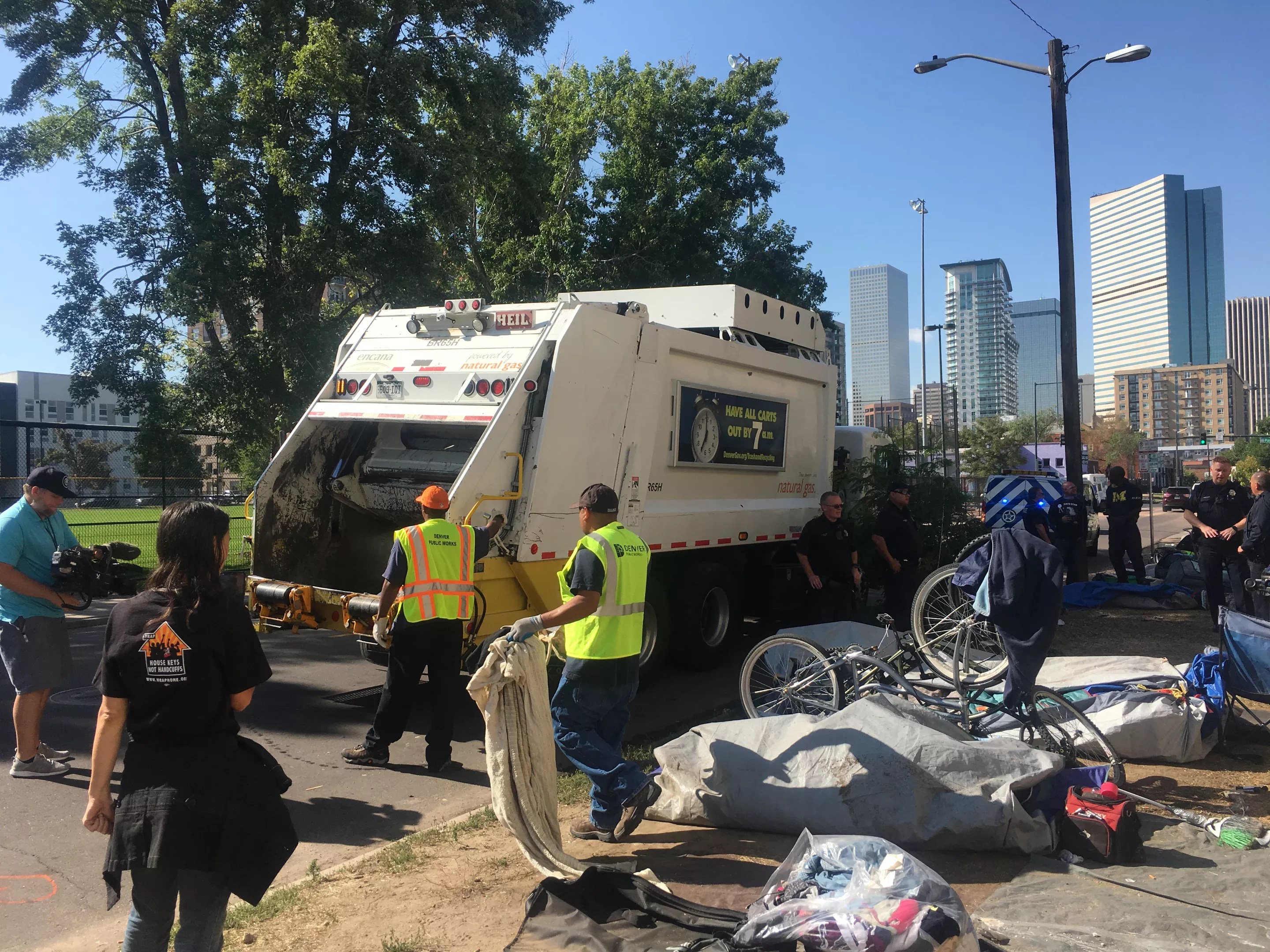
Sara Fleming

Audio By Carbonatix
A judge erred when he ruled that Denver’s camping ban was unconstitutional, attorneys argue in the city’s appeal of that decision.
The appeal brief, filed last month in Denver District Court, challenges the December 2019 ruling of Judge Johnny Barajas, who said that the camping ban ordinance, passed by Denver City Council in 2012 and approved by Mayor Michael Hancock, violates the Eighth Amendment’s prohibition on cruel and unusual punishment.
Barajas determined that the camping ban, which prohibits homeless individuals from sheltering outside using tents or sleeping bags, is “facially unconstitutional,” violating the Eighth Amendment as written, rather than simply as applied in certain circumstances. In making that ruling, he threw out the entire ordinance.
Barajas has since retired from his position as judge in Denver County Court.
In attempting to get that ruling reversed and keep all or at least part of the ordinance on the books, the Denver City Attorney’s Office is arguing that Barajas got this one wrong.
In the 34-page appeal brief, filed April 1, the city’s attorneys say that the ban can’t be unconstitutional, since the “text of the Ordinance punishes the conduct of camping, not the status of being homeless, and numerous circumstances exist under which it may be applied constitutionally.”
For example, the brief argues, enforcing the camping ban against “devoted fans who voluntarily camp on public property or private property the night before a Broncos game, Rockies game, or Avalanche game” wouldn’t constitute a violation of their constitutional rights.
But Andy McNulty, the lawyer going against the city in this case, argues that Denver ‘s attorneys are misinterpreting the meaning of a facial challenge by assuming that a law must be unconstitutional when applied to every single person.
“Facial unconstitutionality is about the application being unconstitutional to a significant number of people, and that’s the case here in the city of Denver,” McNulty says. “The camping ban is being unconstitutionally enforced to a large swath of people that can’t access shelter.”
The city’s appeal argues that Barajas relied too heavily on what it characterizes as a flawed 2018 decision in the Ninth Circuit Court of Appeals that struck down a camping ban in Boise, Idaho.
And even if a court were to view the Boise decision as valid, the brief claims, it bars the “criminalization of public camping only ‘when no sleeping space is practically available in any shelter,’ but ‘does not cover individuals who do have access to’ a practically available shelter.” Therefore, the Boise decision dealt with an as-applied challenge rather than a facial challenge, so Barajas erred in relying on that case to determine the facial unconstitutionality of the Denver camping ban.
And in any case, the city attorneys argue, as applied in Denver, the camping ban did not violate the Eighth Amendment.
The Barajas decision focuses on the camping ban citation issued in April 2019 to Jerry Burton. He did have access to shelter, the appeal argues; city employees offered him a space in one of the nearby facilities, which were under capacity on that night, but he refused to take them up on the offer.
But while Denver shelters may be under capacity, that doesn’t mean all homeless individuals have meaningful access to them, McNulty argues.
“On any given night in the city of Denver, there are populations of folks who simply can’t access shelter,” he says, listing people with service dogs or those with mental illnesses as the types of individuals who might not have real access to shelters. “Criminalizing them simply for trying to exist outside violates the Eighth Amendment and the Colorado Constitution’s cruel-and-unusual-punishment clause.”
McNulty plans to file a response to the city’s appeal by the end of the month.
While the appeal is pending, Denver’s camping ban remains enforceable. As originally envisioned by then-Denver City Council member Albus Brooks, the ordinance was an effective way to get homeless individuals into shelters and provide them access to services. But critics of the ordinance argue that it criminalizes homelessness.
Even though the ban remains on the books, Denver has been citing other city ordinances when dispersing encampments over the past six months, including laws related to public health and the public right-of-way.
During the COVID-19 pandemic, the city has used these ordinances to clean up an area of Five Points that’s seen dozens of tents pop up in recent weeks. But during cleanups on April 30 and again on May 7, individuals were allowed to move their belongings and then return after the cleaning.
A coalition of service providers is currently trying to get the okay from city officials to establish a temporary safe camping site for up to 100 homeless individuals who are reluctant to enter one of the large temporary shelters at the National Western Center and Denver Coliseum. The group has not yet received an answer from the city, but members say they’ve already secured private funding for the project.